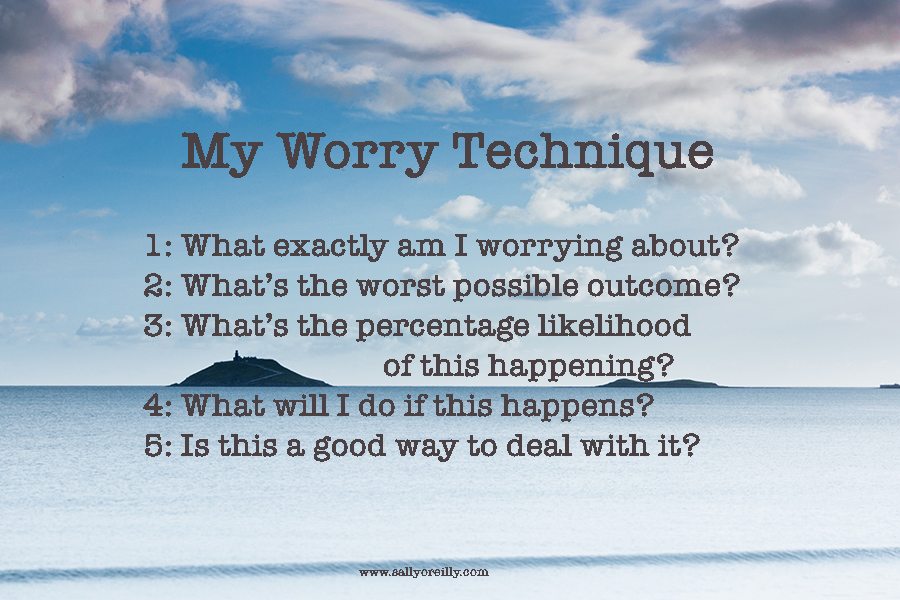It’s 4am. You’re exhausted, but sleep won’t come. You’re replaying a conversation you had earlier and coming up with things you could’ve said, clever things, better things… and now you worry about the consequences.
[bctt tweet=”Then you move onto that crack in the ceiling – what IS that? Is it settlement? What if it’s a sign that you’re house is built on a sinkhole? #worry #anxiety #4AMdemons #selfhelptips #selfhelptechniques #CBT #dontbelievewhatyouthink” username=”psychosal”]
As long as the thoughts are bad enough to trigger anxiety they get a place in your private 4am terror fest. Been there? Yes…same. It feels awful.
Here’s what we know:
We tend to ask questions in our head when we worry. Most of those questions start with “OMG what if?!
And then the feeling of panic comes up, often pretty quickly, so quickly it feels automatic, out of control.
Here’s what else we know:
If we think a fear-based thought we feel afraid. If we think about a happy occasion we feel happier. We respond to happy faces within milliseconds, even if we just imagine them! We feel better when we see a smile because it makes us think about smiles and happiness:
See?
How we think effects how we feel. So it follows that if we can better control how we think, we’ll have a better chance of controlling how we feel.
Simply saying “arra don’t worry!” doesn’t work. I bet you’ve said that to someone – I bet you’ve had it said to you! And how helpful was it? If it wasn’t always comforting, did you instead feel annoyed?
Maybe even dismissed?
And so here’s my first tip:
Don’t tell yourself to stop worrying. Because you can’t – at least not instantly. If I tell you not to think about blue elephants – what do you think about?
So there is a certain amount we cannot control. True. What I’m suggesting you do is focus on what you can control: like, how big your elephant is, how many there are, where they are, how noisy they are, what they are doing, are they moving?
And so, weirdly, I’m encouraging you to pay attention to the thoughts, and go with, rather than judge and resist them. (Bear with me!)
When you pay attention to your worry thoughts you will notice two things:
- You ask questions but you don’t answer them
- You make predictions with neither experience nor evidence.
1: Unanswered questions:
Those of you with kids will know that if you want to frustrate a child, simply let their questions go unanswered. We don’t really grow out of that. We need answers, because we like to feel in control. (This is normal – you’re not a control freak!)
2: Predictions:
We make fiercely dramatic predictions assumptions and scenarios. They pop into our heads erratically, illogically. And we tend to believe them as if they are real. It all sounds a bit mad, and yet it’s quite normal.
The good news is that we can reign this in by being more aware of what we are doing!
Notice and listen to what you are saying to yourself. You’ll see that you have no evidence to support the non fact that your new spot is skin cancer.
When we don’t challenge thoughts, don’t even notice them they just reappear and replay. It’s pure habit. That’s what makes us even more anxious, wakeful, stressed, distracted and before long we are feeling the physical symptoms of anxiety – racing heart, dizzy, confused, sweaty, nausea…
My second tip (the what-to-do bit!):
As soon as you notice yourself feeling anxious try this technique. This technique is about worrying constructively rather than destructively. It has a beginning and importantly, an end.
How to use your technique (with an example):
It’s made of 5 questions – answer each question specifically:
1: What exactly am I worrying about? The future? Too big. Right now what exactly is one thing am I worrying about?
Maybe it’s getting lost in a new city. Let’s take that as an example.
2: Next what’s the worst thing that could happen? You’ll be lost and you’ll be wandering around aimless for the rest of your life and die of starvation?
Too much? OK so maybe the worst is you will feel lost for a while and be scared? Let yourself get specific and realistic, less dramatic. We all ‘catastrophise’ when we worry!
3: What is the percentage likelihood of this happening? You might want to jump in there with 50-70%. But check. Use past experience of getting lost, etc. Most 50% answers turn into 5% or less if you really, really think about it rationally. If it’s 0%, move on, you’ve finished worrying and remind yourself of that when it comes back into your head (because it will!!)
If it’s more than 0% then next up is:
4: What will I do if this happens? Cry, be upset, find a police station? Call someone? Ask for directions? These are all valid options.
5: Last question – Is this a good way to deal with it? If the answer to no.4 is “I’ll lie down and cry and stay there forever” – (because we can get very dramatic) then the answer to no.5 is a resounding ‘no’, so go back, figure out no.4 until you have a yes.
The ‘yes’ means you have now considered and come up with a solution to the worst possible outcome, even if it’s grim, even if it’s hard. Any scenario less than worst is not worth devoting time to because you now have evidence that you can create solutions to the very worst. Yay you!
So that’s one way to manage worry thoughts that has worked for many of my clients.
Remember: worry is fear about something that is not actually happening in the moment. The more we can stay in the moment, the more we can stay worry-free.
See you next time and meanwhile: Don’t believe everything you think!

(*This is a rework of a post on sister site TwoWiseChicks – feel free to pop over for more self-help pieces written by me and my colleague Tanya Tinney! )
Further reading: I just came across this blog post and it’s great. If you feel anxiety often, give this a read too!
14 Reasons why Anxiety Sucks (& what you can about it!)


